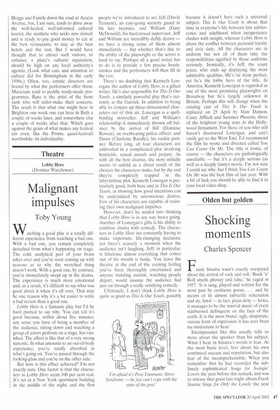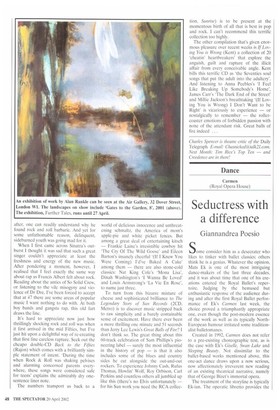Olden but golden
Shocking moments
Charles Spencer
Frank Sinatra wasn't exactly overjoyed about the arrival of rock and roll. 'Rock 'n' Roll smells phoney and false,' he raged in 1957. 'It is sung, played and written for the most part by cretinous goons . . . and by means of its almost imbecilic reiteration and sly, lewd — in fact, plain dirty — lyrics, it manages to be the martial music of every sideburned delinquent on the face of the earth. It is the most brutal, ugly, desperate, vicious form of expression it has ever been my misfortune to hear.'
Intemperance like this usually tells us more about the speaker than his subject. What I hear in Sinatra's words is fear. At the most basic level, fear about his own continued success and reputation, but also fear of the incomprehensible. When you remember that he had recorded the sublimely sophisticated Songs for Swingin' Lovers the year before this remark, and was to release that great late-night album Frank Sinatra Sings for Only the Lonely the year after, one can readily understand why he found rock and roll barbaric. And yet for some unfathomable reason, delinquent, sideburned youth was going mad for it.
When I first came across Sinatra's outburst I thought it was sad that such a great singer couldn't appreciate at least the freshness and energy of the new music. After pondering a moment, however, I realised that I feel exactly the same way about rap as Francis Albert felt about rock. Reading about the antics of So Solid Crew, or listening to the vile misogyny and violence of Dr Dre, I've been forced to accept that at 47 there are some areas of popular music I want nothing to do with. At both boy bands and gangsta rap, this old fart draws the line.
It's hard to appreciate now just how thrillingly shocking rock and roll was when it first arrived in the mid Fifties, but I've just hit upon a delightful way of re-creating that first fine careless rapture. Seek out the cheapo double-CD Back to the Fifties (Rajon) which comes with a brilliantly simple statement of intent. 'During the time when Rock & Roll was shaking pelvises and alarming concerned parents everywhere, these songs were considered safe for teens' explains the admirably dry onesentence liner note.
The numbers transport us back to a world of delicious innocence and unthreatening schmaltz, the America of mom's apple-pie and white picket fences. But among a great deal of entertaining kitsch — Frankie Laine's irresistible cowboy hit 'The Cry Of The Wild Goose' and Eileen Barton's insanely cheerful '(If I Knew You Were Coming) I'd've Baked A Cake' among them — there are also stone-cold classics: Nat King Cole's 'Mona Lisa', Dinah Washington's 'I Wanna Be Loved' and Louis Armstrong's 'La Vie En Rose', to name just three.
To turn from this bizarre mixture of cheese and sophisticated brilliance to The Legendary Story of Sun Records (2CD, Metro) is to discover music stripped back to raw simplicity and a barely containable sense of excitement. Have there ever been a more thrilling one minute and 51 seconds than Jerry Lee Lewis's Great Balls of Fire? I don't think so. The great thing about this 60-track celebration of Sam Phillips's pioneering label — surely the most influential in the history of pop — is that it also includes some of the blues and country sides he cut alongside the out-and-out rockers. To experience Johnny Cash, Rufus Thomas, Howlin' Wolf, Roy Orbison, Carl Perkins and countless others all jumbled up like this (there's no Elvis unfortunately — for his Sun work you need the RCA collec
tion, Sunrise) is to be present at the momentous birth of all that is best in pop and rock. I can't recommend this terrific collection too highly.
The other compilation that's given enormous pleasure over recent weeks is If Loving You is Wrong (Kent) a collection of 20 'cheatin' heartbreakers' that explore the anguish, guilt and rapture of the illicit affair from every conceivable angle. Kent bills this terrific CD as 'the Seventies soul songs that put the adult into the adultery'. And listening to Anna Peebles's 'I Feel Like Breaking Up Somebody's Home', James Carr's 'The Dark End of the Street' and Millie Jackson's breathtaking `(If Loving You is Wrong) I Don't Want to be Right' is vicariously to experience — or nostalgically to remember — the rollercoaster emotions of forbidden passion with none of the attendant risk. Great balls of fire indeed ...
Charles Spencer is theatre critic of the Daily Telegraph. E-mail: Chasnicked@talk21.com, Next Month: Tim Rice's Top Ten — and Creedence are in there!







































































 Previous page
Previous page